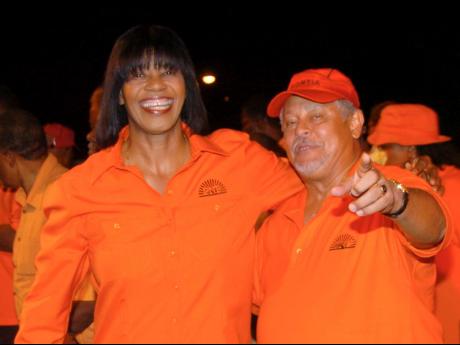Paul Robertson praised as patriot, PNP stalwart
Phillips: He rebuilt party after 1980 shellacking
Late former government minister Dr Paul Robertson has been lauded by People’s National Party (PNP) stalwarts as a devoted patriot and tremendous leader.
Robertson died at St Ann’s Bay Hospital on Saturday following a brief illness. He was 75.
He served as a minister of government in a number of portfolios, namely foreign affairs and foreign trade, industry and commerce, development, public service, information, and culture.
Robertson also had a stint as senator between 1989 and 1993.
He resigned from the Cabinet to take on the position as campaign director of the PNP in November 2001 to help propel the party to an election victory the following year and to claim an unprecedented hold on governance for 18 years that finally ended in 2007.
Robertson was also member of parliament for St Catherine South East from 1993 to September 2007.
Maxine Henry-Wilson, a former general secretary of the PNP, told The Gleaner that Robertson will be remembered for his kindness, compassion, and gentleness.
She said he was recruited by the late prime minister, Michael Manley, for whom he served as special assistant in 1978 and research assistant from 1981 to 1982.
He became general secretary of the PNP in 1983 and served until 1991.
“Justifiably, people are very sceptical and distrusting of political leadership, but I think if there is anybody who epitomises what political leadership can and should be, it’s Dr Robertson,” Henry-Wilson said.
Born in St Andrew on July 7, 1946, Paul Robertson was the son of Cyril and Dorothy Robertson.
He was educated at Mount Industry Primary, York Castle High, Oberlin High, and Jamaica College and later studied at The University of the West Indies and the University of Michigan.
Robertson had several teaching stints locally and abroad, including at Howard University, before assuming administrative and operational roles in the PNP.
John Junor, a good friend and political colleague of Robertson’s, described him as affable, calm, and one of the most analytical persons he knew.
Junor explained that he had the ability to sum up a situation and act quickly, a quality that contributed to his success as general secretary and member of parliament.
“There was a time when people referred to the three disciples: Paul, Peter, and John. We enjoyed a good relationship, and he will be deeply missed,” Junor said.
The Peter in that biblical trio referred to Dr Peter Phillips, the current member of parliament for St Andrew East Central and former opposition leader and PNP president.
LIFE OF SERVICE
Phillips said that Robertson completed university education in the immediate years after Jamaica’s Independence and devoted his life to serving his country and its people.
“Along with Michael (Manley) and P.J. Patterson, Paul as general secretary was an architect of the rebuilding of the party after its defeat in 1980,” said Phillips of the election that centred on the counter-cultural philosophies of capitalism and democratic socialism.
Describing Robertson as quiet and soft-spoken, Phillips said that the party loyalist continued to give national and community service even after his departure from active political life.
Former Prime Minister Bruce Golding said that his association with Robertson dated back to 1963 when they started Jamaica College as sixth-formers.
“That friendship and mutual respect endured despite our political differences and even during the turbulent period of the 1970s,” Golding said.
Golding and Robertson worked closely in 1979 on drafting the framework and operational arrangements for the Electoral Advisory Committee, which later became the Electoral Commission of Jamaica, the game-changing organisation that reformed the island’s voting policies and culture.
Robertson and Golding were among its first members.
Harry Douglas, member of parliament for St Mary South East from 1989 to 2007, said Robertson was a tremendous leader who always sought to solve problems.
“He was a friend, a father, an outstanding Jamaican, and a party loyalist. He didn’t stand for stupidness, and he was certain to make you know if you were right or wrong,” Douglas said.

